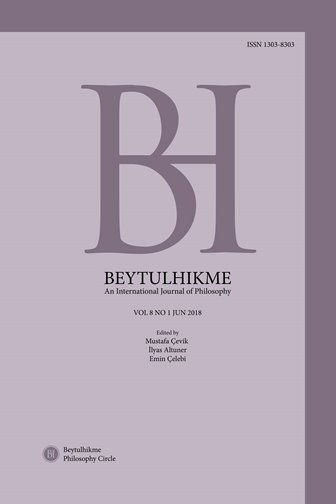Author :
Abstract
Descartes’ın metafizik projesinin merkezinde kendilik, Tanrı ve dış dünya temaları bulunmaktadır. Descartes, kendiliği uzamlı tözden ayırarak onu düşünen töz olarak ele alır. Yaratılmamış töz olan Tanrı’nın aksine, kendilik ve dış dünya yaratılmış tözler olarak düşünülürler. Bu makale üç ana konuya odaklanmaktadır. Birincisi, Descartes’ın kendilik ve dış dünya hakkındaki düşüncelerinin ne olduğunu, varoluş ve sürerlik üzerinden anlamaya çalışmaktır. İkincisi, Descartes’ta kendiliğin dış dünyaya nasıl erişim sağladığını göstermektir. Sonuncusu ise Descartes’ın metafizik projesindeki, diğer bir deyimle kendilik, dış dünya ve bunlar arasındaki ilişkiyi açıklama girişimindeki, eksikliğe dikkat çekmektir. Bu makalede, bulmacadaki eksik parça olan zaman yerine konularak söz konusu eksiklik giderilmeye çalışılacaktır.
Keywords
Abstract
Descartes’ metaphysical project revolves around the themes of the self, God, and the external world. He takes the self as a thinking substance by separating it from the extended substance. Unlike God – the uncreated substance – the self and the external world are considered to be created substances. This paper has three objectives. The first is to find out Descartes’ answer to the question of what the self and the external world are by examining existence and persistence. The second is to show how Descartes demonstrates the self-getting access to this world. The last is to point out the deficiency in his metaphysical project, namely, the deficiency in his accounts of the self, the external world, and the relation between them. This paper attempts to make up for this deficiency by putting the missing piece, i.e., time into its place.
Keywords
- Beyssade, J-M. (1979). La Philosophie Premiere de Descartes. Paris: Flammarion.
- Bonnen C. A. & Flage D. E. (2000). Descartes: The Matter of Time. International Studies in Philosophy, 32 (4).
- Copleston F. (1994). A History of Philosophy Modern Philosophy: From Descartes to Leibniz. New York: Image Books.
- Cottingham, J. (1988). The Rationalists. Oxford: Oxford University Press.
- Cottingham, J. (1993). A Descartes Dictionary. Oxford: Blackwell Publishers.
- Descartes, R. (1982). The Principle of Philosophy. (Trans. V. R. Miller & R. P. Mil- ler). London: Kluwer Academic Publishers.
- Descartes, R. (1984). The Philosophical Writings of Descartes, vol. I. (Trans. J. Cot- tingham & R. Stoothoof & D. Murdoch). Cambridge: Cambridge University Press.
- Descartes, R. (1985). The Philosophical Writings of Descartes, vol II. (Trans. J. Cot-
- Descartes, R. (1993). Meditations on First Philosophy. (Ed. S. Tweyman). London & New York: Routledge.
- Descartes, R. (2006). A Discourse on the Method. (Trans. I. Mclean). Oxford: Ox- ford University Press.
- Descartes, R. (2010). Objections to the Meditations and Descartes’s Replies. (Trans. J. Bennett). Last Modified: November, 2007.
- Floridi, L. (2000). Mathematical Skepticism: The Cartesian Approach. The Pro- ceedings of the Twentieth World Congress of Philosophy, 6, 217-265.
- Garber, D. (1992). Descartes’ Metaphysical Physics. Chicago & London: The Univer- sity of Chicago Press.
- Garrett, B. (1985). Personal Identity and Self-Consciousness. London & New York: Routledge.
- Gassendi, P. (2010). Fifth Objections (Gassendi) and Descartes’s Replies. R. Des- cartes, Objections to the Meditations and Descartes’s Replies. (Trans. J. Bennett). Last Modified November, 2007, 83-146.
- Gorham, G. (2007). Descartes on Time and Duration. Early Science and Medicine, 12, 28-54.
- Laporte, J. (1945). Le Rationalisme de Descartes. Paris: Presses Universitaires de France.
- Locke, J. (1999). Essay Concerning Human Understanding. Pennsylvania: Pennsylvania State University Press.
- Maclean, I. (2006). Introduction. R. Descartes. A Discourse on the Method. Oxford: Oxford University Press, vii-lxx.
- Markie, P. (1992). The Cogito and its Importance. The Cambridge Companion to Descartes. (Ed. J. Cottingham). Cambridge: Cambridge University Press, 140173.





